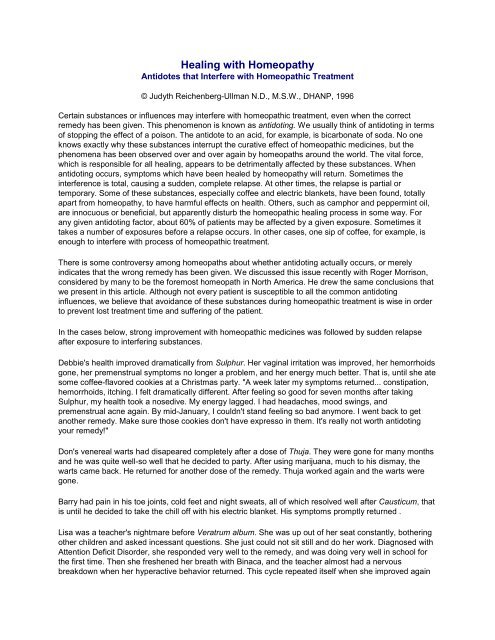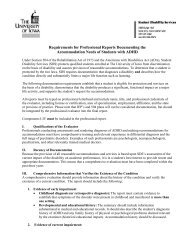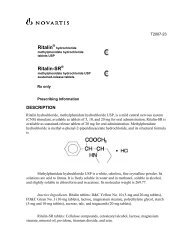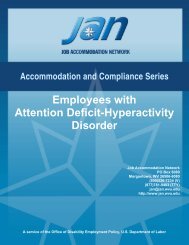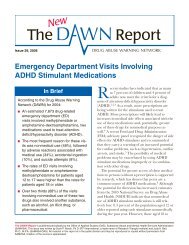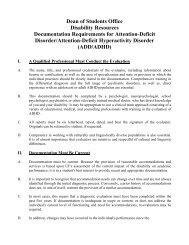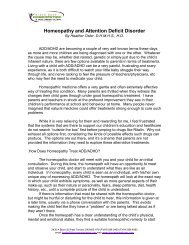Healing With Homeopathy Antidotes That ... - ADHD Info Centre
Healing With Homeopathy Antidotes That ... - ADHD Info Centre
Healing With Homeopathy Antidotes That ... - ADHD Info Centre
You also want an ePaper? Increase the reach of your titles
YUMPU automatically turns print PDFs into web optimized ePapers that Google loves.
<strong>Healing</strong> with <strong>Homeopathy</strong><br />
<strong>Antidotes</strong> that Interfere with Homeopathic Treatment<br />
© Judyth Reichenberg-Ullman N.D., M.S.W., DHANP, 1996<br />
Certain substances or influences may interfere with homeopathic treatment, even when the correct<br />
remedy has been given. This phenomenon is known as antidoting. We usually think of antidoting in terms<br />
of stopping the effect of a poison. The antidote to an acid, for example, is bicarbonate of soda. No one<br />
knows exactly why these substances interrupt the curative effect of homeopathic medicines, but the<br />
phenomena has been observed over and over again by homeopaths around the world. The vital force,<br />
which is responsible for all healing, appears to be detrimentally affected by these substances. When<br />
antidoting occurs, symptoms which have been healed by homeopathy will return. Sometimes the<br />
interference is total, causing a sudden, complete relapse. At other times, the relapse is partial or<br />
temporary. Some of these substances, especially coffee and electric blankets, have been found, totally<br />
apart from homeopathy, to have harmful effects on health. Others, such as camphor and peppermint oil,<br />
are innocuous or beneficial, but apparently disturb the homeopathic healing process in some way. For<br />
any given antidoting factor, about 60% of patients may be affected by a given exposure. Sometimes it<br />
takes a number of exposures before a relapse occurs. In other cases, one sip of coffee, for example, is<br />
enough to interfere with process of homeopathic treatment.<br />
There is some controversy among homeopaths about whether antidoting actually occurs, or merely<br />
indicates that the wrong remedy has been given. We discussed this issue recently with Roger Morrison,<br />
considered by many to be the foremost homeopath in North America. He drew the same conclusions that<br />
we present in this article. Although not every patient is susceptible to all the common antidoting<br />
influences, we believe that avoidance of these substances during homeopathic treatment is wise in order<br />
to prevent lost treatment time and suffering of the patient.<br />
In the cases below, strong improvement with homeopathic medicines was followed by sudden relapse<br />
after exposure to interfering substances.<br />
Debbie's health improved dramatically from Sulphur. Her vaginal irritation was improved, her hemorrhoids<br />
gone, her premenstrual symptoms no longer a problem, and her energy much better. <strong>That</strong> is, until she ate<br />
some coffee-flavored cookies at a Christmas party. "A week later my symptoms returned... constipation,<br />
hemorrhoids, itching. I felt dramatically different. After feeling so good for seven months after taking<br />
Sulphur, my health took a nosedive. My energy lagged. I had headaches, mood swings, and<br />
premenstrual acne again. By mid-January, I couldn't stand feeling so bad anymore. I went back to get<br />
another remedy. Make sure those cookies don't have expresso in them. It's really not worth antidoting<br />
your remedy!"<br />
Don's venereal warts had disapeared completely after a dose of Thuja. They were gone for many months<br />
and he was quite well-so well that he decided to party. After using marijuana, much to his dismay, the<br />
warts came back. He returned for another dose of the remedy. Thuja worked again and the warts were<br />
gone.<br />
Barry had pain in his toe joints, cold feet and night sweats, all of which resolved well after Causticum, that<br />
is until he decided to take the chill off with his electric blanket. His symptoms promptly returned .<br />
Lisa was a teacher's nightmare before Veratrum album. She was up out of her seat constantly, bothering<br />
other children and asked incessant questions. She just could not sit still and do her work. Diagnosed with<br />
Attention Deficit Disorder, she responded very well to the remedy, and was doing very well in school for<br />
the first time. Then she freshened her breath with Binaca, and the teacher almost had a nervous<br />
breakdown when her hyperactive behavior returned. This cycle repeated itself when she improved again
with Veratrum, only to have her grandmother use Vick's Vapo-rub on her for a chest cold. The teacher<br />
complained again.<br />
Nancy's migraines were completely relieved by Natrum muriaticum, but they returned at three month<br />
intervals like clockwork. This was a mystery until we matched her frequency of having her hair permed.<br />
Whenever she had a permanent wave, her migraines came back.<br />
Not every person is affected by potentially antidoting substances in the same way. Antidoting may occur<br />
at any time, even two years after a remedy has been given, if the effect of the exposure is strong enough<br />
to affect your vital force. There is general agreement among homeopaths that the substances and<br />
influences below often antidote homeopathic remedies. Many practitioners give their patients a list of<br />
which substances to avoid. Others decide not to make antidotion an issue unless it actually occurs, so as<br />
to not limit their patients' freedom unnecessarily.<br />
What to Avoid While Under Homeopathic Treatment:<br />
1. Coffee: This is the one substance which is most often responsible for homeopathic antidotion.<br />
Even one sip of coffee or a small amount of coffee ice cream, kahlua, or coffee bean candy may<br />
antidote a homeopathic remedy. It appears to be the oils in coffee rather than the caffeine alone<br />
which is the culprit. Although caffeinated tea is not a problem with homeopathy, strongly<br />
caffeinated substances like Zoom or No-doz should also be avoided as well as guarana and mate<br />
(caffeinated beverages from South America).<br />
2. Electric blankets: They affect remedies by altering your body's electromagnetic field.<br />
3. Aromatic substances: Avoid camphor, eucalyptus, menthol, and any products which contain them<br />
including Vick's, Noxema, Tiger Balm, Ben Gay, Calamine lotion, and cough drops and lozenges<br />
containing these substances. This includes menthol and other aromatic mouthwashes; and Vicco<br />
Ayurvedic toothpaste.<br />
4. Citronella oil, pennyroyal, and other aromatic herbal mosquito repellants, all thuja and tea tree<br />
(melaleuca) products, peppermint oil, and lavender oil may antidote remedies due to their<br />
aromaticity. Chapstick, Blistex, and other aromatic lip balms should also be avoided. Strong<br />
fumes from oil-based paint, turpentine, paint thinner and certain household cleaning agents such<br />
as Pine Sol, Lysol, and strong-smelling industrial chemicals may also interfere with remedies.<br />
5. Medications: Homeopathic medicines will not prevent prescription drugs from working, but<br />
prescription drugs may interfere with homeopathic remedies. These include antibiotics, cortisone,<br />
and antifungals, whether topical or oral. Consult with your practitioner about any drugs which you<br />
are taking. If you experience severe pain, aspirin or Tylenol usually do not interfere with<br />
homeopathic remedies.<br />
6. Immunizations: Immunizations may interfere with remedies. Whether you take them or not is your<br />
personal choice, however you may want to discuss their effects with your practitioner.<br />
7. Dental work: Homeopathic remedies are often antidoted by dental drilling and the use of<br />
novocaine. It is preferable, if possible, to wait at least three or four months after taking a remedy<br />
to have dental work done. In the case of emergency dental work, have it done and call your<br />
practitioner afterwards. In many cases, homeopathic remedies will relieve dental pain until you<br />
have a chance to visit your dentist.<br />
8. Drugs: Avoid all recreational drugs including marijuana, cocaine, LSD, barbituates,<br />
amphetamines and prescription pain medications. Alcohol in moderation will not interfere with<br />
homeopathic remedies.<br />
9. Other homeopathic remedies: Do not use Bach Flower remedies, cell salts, or other homeopathic<br />
remedies without discussing them with your homeopath first.<br />
10. Herbs: Check with your homeopath before using herbs for specific medicinal purposes while you<br />
are under homeopathic treatment. Herb teas for beverage use, when varied from day, to day are<br />
fine as are culinary herbs. Chinese herbs and moxa may antidote remedies. If you've been given
Natrum muriaticum, you will be advised to avoid peppermint in all forms, including tea. The<br />
remedy Sulphur may be antidoted by chamomile tea and Sepia by vinegar.<br />
11. Vitamins: Let your homeopath know which vitamins you are taking. Taking a particular vitamin to<br />
eliminate a particular symptom may make it difficult for your homeopath to evaluate your<br />
symptoms. Multivitamins and minerals do not disturb homeopathic treatment.<br />
12. Beauty treatments: Permanent waves often antidote remedies because of the harsh and aromatic<br />
chemicals. Some skin products and facial treatments will antidote remedies if they contain<br />
aromatic substances.<br />
13. Other therapies: Acupuncture and therapeutic ultrasound have been found to often antidote<br />
homeopathic treatment. Some homeopaths have found certain forms of bodywork, including<br />
shiatsu and rolfing, to antidote their patients' remedies in some cases.<br />
Factors Which Do Not Antidote Homeopathic Remedies:<br />
1. Medications: Aspirin, Tylenol, Advil, Motrin, Ibuprofen and other non-steroidal anti-inflammatories,<br />
when used infrequently, will usually not interfere with homeopathic treatment.<br />
2. Heating pads and water bed heaters.<br />
3. Medical tests: Blood tests, X-rays, mammograms, Pap smears.<br />
4. Dental examination and cleaning (except when ultrasound is used).<br />
5. Cleaning products: Ammonia and bleach. ( Wear rubber gloves and dilute.)<br />
6. Personal care products: Most toothpastes (except Vicco), deodorants that are not strongly<br />
aromatic, aftershaves without menthol. Soaps, perfumes, and colognes which do not contain the<br />
substances listed in the antidote section are fine.<br />
7. Therapies: Massage, (using non-aromatic oils), chiropractic adjustments and many other forms of<br />
bodywork are generally compatible with homeopathy. If your complaints are primarily<br />
musculoskeletal, it is best to discuss the frequency of these treatments with your homeopath.<br />
If you think you have antidoted (interfered with the action of) your remedy, your homeopath will usually<br />
wait one to two weeks before re-evaluating your case and deciding whether to repeat your remedy. This<br />
waiting period is necessary in order to evaluate whether your previous symptoms return and to give you a<br />
chance to bounce back without the need for repeating the remedy.<br />
You may feel that the list of potential antidotes places too many restrictions on your life and makes you<br />
feel rebellious. The idea is not to make you walk on eggs and fear any potential influence, just for you to<br />
be reasonably prudent about avoidable exposures. Most homeopathic patients find that it becomes<br />
relatively easy to avoid these factors and that allowing their remedies to work over time is well worth the<br />
effort. Patients generally find that the increased freedom in their life resulting from homeopathy is greater<br />
than the freedom of drinking coffee or using menthol. If you do feel too restricted by your homeopathic<br />
treatment, discuss this with your practitioner. Perhaps you are avoiding some substances unnecessarily.<br />
If your treatment has been going well and you feel you just have to drink some coffee, you can test it, but<br />
let your homeopath know so he or she can adjust your treatment accordingly.<br />
This article was excerpted from The Patient's Guide to Homeopathic Medicine (1994). Drs. Robert Ullman<br />
and Judyth Reichenberg-Ullman are board-certified diplomates of the Homeopathic Academy of<br />
Naturopathic Physicians. They teach homeopathy for the professional course of the International<br />
Foundation for <strong>Homeopathy</strong>, of which Dr. Reichenberg-Ullman is president. They practice at the<br />
Northwest Center for Homeopathic Medicine in Edmonds, Washington.


